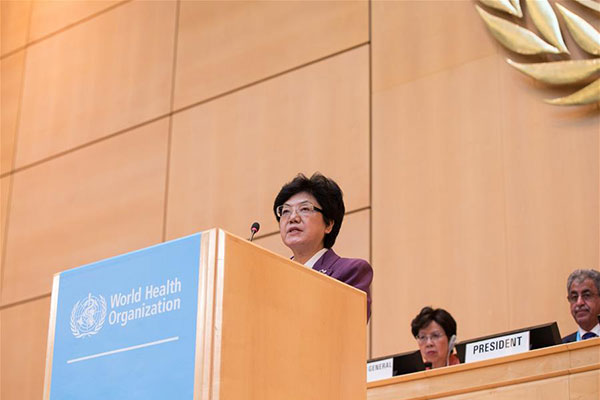
China’s minister of National Health and Family Planning Commission (NHFPC) Li Bin (front) attends the 69th World Health Assembly in Geneva, Switzerland on May 23, 2016. [Photo/Xinhua]
GENEVA — China’s minister of National Health and Family Planning Commission (NHFPC) Li Bin stressed on May 23 the importance of achieving the Sustainable Development Goals (SDG) while underscoring China’s concerted efforts to improve the country’s health outlook.
“People’s health is the cornerstone of economic development and the driving force of social progress,” Li said in the general discussion of the 69th World Health Assembly which kicked off Monday in Geneva.
China has adopted a number of key policies to improve the provision of medical care and health insurance while ensuring adequate drug supplies and regulation in view of reaching objectives set by Beijing’s “healthy China” strategy.
The central leadership underscored this framework in the proposal for the 13th Five-Year Plan (2016 to 2020), a key period for China to accomplish the first centenary goal of building a moderately prosperous society in all respects by 2020.
While acknowledging that more needs to be done, Li indicated that with an average life expectancy now exceeding 76 years and with decent overall health indicators, China has laid a solid foundation for achieving the sustainable development agenda.
China’s critical role in providing assistance to those countries around the world which face health scourges is also particularly important in the context of a world which is increasingly interconnected and where diseases know no boundaries.
Over the years, China has sent over 23,000 healthcare workers to 66 countries to protect vulnerable populations from myriad health issues.
It also supports north-south and south-south cooperation on a number of topical health imperatives.
“The 2030 sustainable development agenda reflects mankind’s new aspirations for health. It pronounces the international determination in addressing health threats,” Li explained.
The assembly, WHO’s main decision-making body, will set policies on a broad range of high-priority health issues, from maternal and child nutrition, universal health coverage to health emergencies.
Convened annually and ending on May 28, this year’s meeting is the biggest to date, bringing together some 3,500 people.
Some 21 resolutions are expected to be discussed by delegations from WHO’s 194 members.
